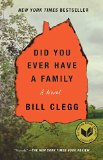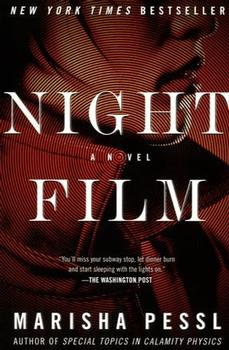Summary | Excerpt | Reading Guide | Reviews | Beyond the book | Read-Alikes | Genres & Themes | Author Bio

Oh, families. They are the people who can sometimes hurt us the most, calling us out for our weaknesses and mistakes. However, when we are down, they are the ones who can help us heal the most too. For the most part, living without a family would be tough. Bill Clegg's Did You Ever Have A Family explores how losing one's family can tear a person apart.
Clegg's novel begins with the greatest of all family events: a wedding. June Reid, a rather dynamic, middle-aged woman, living in a small Connecticut town, is hosting a wedding for her daughter. The night before the wedding, after all of the rehearsal activities are over, the unthinkable happens. A fire consumes the Reid house, killing everyone except June. Broken, she flees across the country to the west coast.
Surprisingly – and, in my opinion, unfortunately – Did You Ever Have A Family doesn't solely focus on June's reaction to the loss of her family. Instead, Clegg delivers something unusual. He gives us a novel that doesn't really focus on June at all. Sure, her voice appears occasionally to narrate a chapter or two. We get glimpses that she's hurting and that she's lonely, but we never really get to know her. We never get to know anybody all that well – and that's the problem.
Did You Ever Have A Family's short chapters are told from the perspectives of many different characters. All of the individual voices connect with June (or her location) in some way. Some are family members whom she knows, but others are faces that she'll never meet. They seem interesting enough; for example, Dale, a father, is a character whom I'd very much like to know more about. He seems like a caring and intelligent man. Lydia is another interesting character. She's a mother who struggles with making good decisions. I want to know more about what made her the way she is. But the quick and episodic structure of Clegg's novel doesn't allow for enough development. That said, I don't think he intentionally neglects his characters. Rather, it seems like the emotional separation he gives us is intentional. It feels as if the overwhelming density of characters and circumstances is supposed to be a metaphor for the larger loss of life that pervades the novel, a sort of suffocation in grief.
However, there is still a lot to admire in Did You Ever Have A Family. Clegg's prose flows beautifully. The descriptions he paints are simultaneously lyrical and delicate. When describing June's act of leaving after the fire, Clegg writes, "That she has her cash card and car keys with her is luck – they had been in the jacket pockets – but she does not think of herself as lucky. No one does. Still, these stowaways from her old life allow her now to leave town, which is all she wants. It isn't restlessness, or a desire to be somewhere else, but a blunt recognition that her time in this place has expired." He goes deeper, creating vivid imagery to tell of her pain: "The house without sound is now loud with nothing, no one. A molten ache returns, turns in her chest, scrapes slowly. Outside, the daylilies flail in the morning wind." There is no doubt that Clegg is a brilliant wordsmith and one whom I'll read again.
The ending, like the prose itself, is also quite successful. All the many voices come together, and we get a closing that does create some semblance of a catharsis. We see happiness. We see life beyond the past. We see that families do matter and how important they are if we are to survive merrily in the often tedious world.
Reading Did You Ever Have A Family isn't the smoothest ride you'll ever take, but it's one that should prove worthy of your time.
![]() This review was originally published in The BookBrowse Review in October 2015, and has been updated for the
May 2016 edition.
Click here to go to this issue.
This review was originally published in The BookBrowse Review in October 2015, and has been updated for the
May 2016 edition.
Click here to go to this issue.

If you liked Did You Ever Have A Family, try these:

by Marisha Pessl
Published 2014
Brilliant, haunting, breathtakingly suspenseful, Night Film is a superb literary thriller by the New York Times bestselling author of the blockbuster debut Special Topics in Calamity Physics.

by Elizabeth Strout
Published 2008
Winner of the Pulitzer Prize, Olive Kitteridge offers profound insights into the human condition – its conflicts, its tragedies and joys, and the endurance it requires.
There are two kinds of light - the glow that illuminates, and the glare that obscures.
Click Here to find out who said this, as well as discovering other famous literary quotes!
Your guide toexceptional books
BookBrowse seeks out and recommends the best in contemporary fiction and nonfiction—books that not only engage and entertain but also deepen our understanding of ourselves and the world around us.